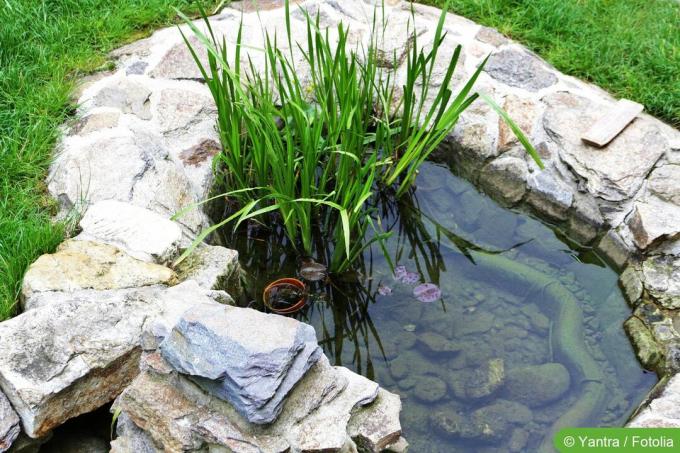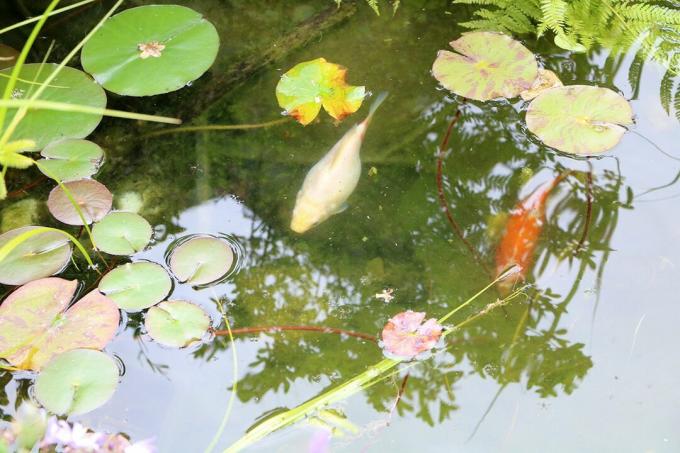

Table of contents
- Make the right preparations in autumn
- Clean up the pond
- The fish overwinter
- This is how it goes after the winter
- Interesting facts about fishing in mini ponds
Since a mini pond is not particularly deep, it can freeze through in very frosty temperatures. The logical consequence of this is that all the fish in the pond and non-hardy plants will die. How to winterize a mini pond and what you should know is in the following text.
Make the right preparations in autumn
If the temperature falls below 8 °C, you should stop feeding the fish in the pond. From now on, the fish move less and also eat much less during the cold period. If the temperatures drop below 8 degrees, you should bring the mini pond indoors and protect the fish from the cold. If the basin of the pond is deeper than 80 cm, then the fish can hibernate outside in the open air. However, if the mini pond is not that deep, the fish must be brought into the house so that they do not freeze to death. The most sensible solution is to carefully disassemble the mini pond and store it in a frost-free basement or garage:
- To do this, coarse dirt such as leaves should be removed with a net.
- The fish should be put into a large tank or large barrels.
- The water temperature should be about the same.
- It is also possible to drain the water for transport and refill it in the basement.
- Ideally, however, the tank should be completely emptied and cleaned.
- To do this, the pond plants are carefully cut back and dead plant parts are removed.
- The pond plants should be placed in a tub.
- It is important that the place does not get too cold.
- Many pond plants do not tolerate frost and would die if the temperatures were too frosty.
- When removing the plants from the pond, make sure that no roots and healthy leaves are damaged.
- Overgrown plants can either be carefully cut by hand or with a knife.
Typical pond plants such as water hyacinth and water lilies are now well prepared for winter and ready to be planted in the mini pond again in spring.
Clean up the pond
After you have removed all the fish, plants and equipment from the pond, it is important to thoroughly clean the basin of the mini pond. Over the course of the year, a lot of bacteria and stubborn dirt settle, which can now be cleaned well. To do this, you should first remove coarse dirt from the pool and then wipe it out with plenty of warm water and a little cleaning agent. The pool can now dry well and is clean. After cleaning, the mini pond can then be set up again outside and filled with mild temperatures. Accessories such as the pump and filter should also be cleaned carefully. The pump may be needed again later to pump the water in the winter bin.
The fish overwinter
As mentioned above, fish should be brought indoors if the tank is less than 80 cm. In order to overwinter the fish healthy and stress-free, you should get a rain barrel. The fish can be easily moved from the pond to the barrel with a net and are kept in the basement or garage. However, it is important that there is no frost where the fish spend the winter. Feeding should also be restricted now, because fish such as the tench also go into hibernation. If the bin is equipped with the pump, you can cover it with a board. The board should definitely be placed on the barrel so that the fish and the water are protected from external influences such as dirt, insects, etc. to be protected. A tarpaulin is also sufficient to protect the fish and the water. If you fill the water in the bin, it is ideal to use a mixture of fresh water and pond water. Thus, the fish are still used to the pond water and receive additional fresh water.
This is how it goes after the winter
Feeding the fish should be resumed a few weeks before releasing them into the mini pond. You start feeding by putting very little food in the water and increasing the amount a little. The fish need about 4 to 8 weeks to get used to the "normal" amount of food again. You should only build up the mini pond again when the temperatures remain above freezing at night. Here, too, a mixture of barrel water and fresh water is ideal to get the fish used to the new situation. Fish that are ideal for a mini pond are, for example, disc bass. Disc bass remain very small and are therefore ideally suited. Depending on the size of the tank, it is also possible to keep a few goldfish or tench in the tank.
If these tips and hints are followed, you can do something good for the fish and the pool in winter. The tank can be cleaned and is germ-free for next year's start. It is not stressful for the fish to hibernate in the cellar and there is no risk of fish dying from the cold. In the spring, the pool can then be set up again without any problems. All overwintered plants and the fish can now be put back into the pond and spend the warm summer there until they go back to the quiet cellar to overwinter in the fall.
Not all people have a large garden, but many of them still want one Pond operate and therefore opt for a mini pond. It can find its place on the terrace as well as on the balcony and so you can enjoy a little nature even if you don't have a garden terrace or. the balcony fetch.
Interesting facts about fishing in mini ponds
- In a concrete bucket or a zinc tub, it is better to avoid animals and prefer beautiful plants.
- Water lilies are particularly suitable here, although they also need a certain depth so that they can grow nicely.
- Green algae, which come in many different types, are more suitable.
If you don't want to do without such a mini pond with fish, you should at least use the smallest pond tub that the specialist trade has to offer:
- A good guideline is a capacity of at least 200 liters.
- Furthermore, when stocking fish, it is important to ensure that you select fish that require little space.
- The fish should also not be very active in swimming.
- In addition, it is essential to ensure that not too many fish are placed in the mini pond.
A bog bed is an alternative to a mini pond. You can also use many beautiful plants here and there are many different insects that then settle here. So you have at least a few animals on the balcony or in the garden. the terrace.
 garden editorial
garden editorial I write about everything that interests me in my garden.
Find out more about animals in the garden pond

22 small pond fish | Fish for small pond
Only a small pond fits in small gardens. But Mother Nature has also created a few little fish for these mini ponds. To be more precise, even several interesting species, which are not inferior in beauty to the large specimens. But be amazed!

7 Fish Diseases | Help for pond fish
For many an animal lover, their fish mean everything. The concern is correspondingly great when the animals suddenly behave in a strange way or show external symptoms of one of the numerous pond fish diseases. This guide explains how the owner makes an exact diagnosis, what causes it and what to do in this case.

Overwintering pond mussels | 14 tips for pond mussels in winter
Pond mussels are practical animals for the garden pond, as they can filter and thus clean the water. Their main food source is algae. But what happens to the pond mussel in winter when the water surface freezes over? Here we reveal how overwintering is possible.

Orfe in the garden pond | 10 tips for keeping & propagation
The water has been filled in, the green planting is in place. Now a color contrast and movement in the garden pond are still missing. A swarm of gold orfs can provide both. Yellow-orange in colour, they are clearly circling in the water. When do you feel comfortable in it?

Frog in the pond: what do frogs eat in the garden pond?
Frogs in the pond are important beneficial insects because they devour numerous annoying pests. Frogs are good and patient hunters, able to ambush prey for a long time. The more diverse the pond is designed, the greater the food supply, which attracts different species.

Sturgeon in the garden pond | 10 tips for keeping in the pond
Would you like to enrich your pond with a real sturgeon? The desire for such a striking animal is easy to understand. Our tips on how to handle this living fossil will help you ensure that keeping is always successful.
